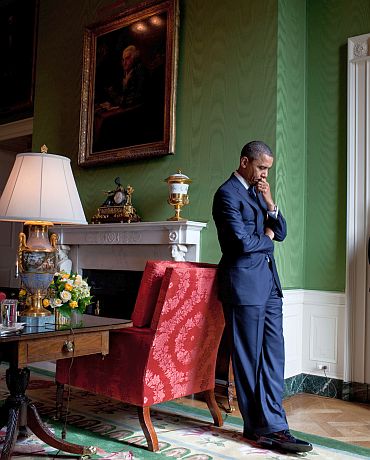This article was first published 14 years ago
Home »
News » We can't move away from Pak, says US
We can't move away from Pak, says US
Last updated on: December 17, 2010 14:11 IST
Image: US President Barack Obama
Photographs: Reuters
The unclassified five-page overview of the Afghanistan-Pakistan annual policy update unveiled by United States President Barack Obama on Thursday tends to sugar-coat the situation in the region. But according to sources, intelligence and background briefings that were a precursor to this 'diagnostic assessment' had strongly warned that Pakistan's continuing tolerance of terrorist havens within its borders and refusal to go after the likes of the Haqqani network jeopardised the little progress achieved in combating the Al Qaeda and the Taliban.
The briefings had pointed to Al Qaeda's core leadership and infrastructure still remaining intact inside the Federally Administered Tribal Areas, with the Haqqani network continuing to protect the terrorist network based in Quetta, while Pakistan continued to court the Afghan Taliban and the Lakshar-e-Tayiba -- responsible for the horrific terrorists attacks in Mumbai -- for its own vested interests.
Apparently, the only group the Pakistani army was going after was the Pakistani Taliban that has been targeting the army and the Inter Services Intelligence.
Obama, in his remarks at the White House briefing room, claimed, "In pursuit of our core goal, we are seeing significant progress. Today, Al Qaeda's senior leadership in the border region of Afghanistan and Pakistan is under more pressure than at any point since they fled Afghanistan nine years ago. Senior leaders have been killed. It's harder for them to recruit; it's harder for them to travel; it's harder for them to train; it's harder for them to plot and launch attacks."
Reportage: Aziz Haniffa in Washington, DC
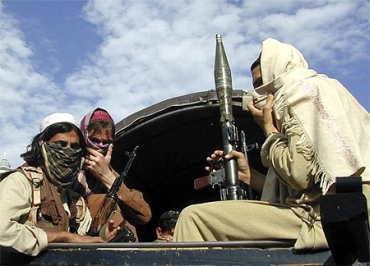
"In short, Al Qaeda is hunkered down," he said, though acknowledging that "it will take time to ultimately defeat Al Qaeda, and it remains a ruthless and resilient enemy bent on attacking our country. But make no mistake -- we are going to remain relentless in disrupting and dismantling that terrorist organisation."
Addressing the permeating theme of the intelligence and background briefings of the continuing terrorist havens in Pakistan, Obama said, "Increasingly, the Pakistani government recognises that terrorist networks in its border regions are a threat to all our countries, especially Pakistan."
He said, "We have welcomed major Pakistani offensives in the tribal regions. We will continue to help strengthen Pakistanis' capacity to root out terrorists. Nevertheless, progress has not come fast enough. So we will continue to insist to Pakistani leaders that terrorist safe havens within their borders must be dealt with."
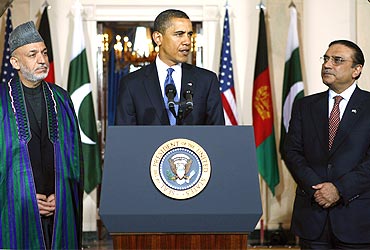
Image: Obama with Afghanistan President Hamid Karzai and Pakistan President Asif Ali Zardari
Photographs: Reuters
Obama, who had spoken to Pakistani President Asif Ali Zardari and Afghanistan President Hamid Karzai ahead of releasing the review and discussed its findings with them, said, "Next year, I look forward to an exchange of visits, including my visit to Pakistan, because the United States is committed to an enduring partnership that helps deliver improved security, development, and justice for the Pakistani people."
But after he left with Vice President Joseph Biden without taking any questions, US Secretary of State Hillary Clinton and Defence Secretary Robert Gates were peppered with questions Pakistan's inability to dismantle several terrorist havens.
The review had said, "There has been significant progress in disrupting and dismantling the Pakistan-based leadership and cadre of Al Qaeda over the past year," and that Al Qaeda's "senior leadership has been depleted, the group's safe haven is smaller and less secure, and its ability to prepare and conduct terrorist operations has been degraded in important ways."
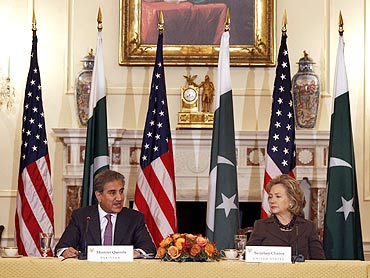
Image: US Secretary of State Hillary Clinton with Pakistan's Foreign Minister Shah Mehmood Qureshi
Photographs: Reuters
But it acknowledged, "The compounding losses of Al Qaeda's leadership cadre have diminished -- but not halted -- the group's ability to advance operations against the United States and our allies and partners, or to support and inspire regional affiliates."
It also admitted that "Progress in our relationship with Pakistan over the last year has been substantial, but also uneven".
The overview said, "For instance, the denial of extremist safe havens will require greater cooperation with Pakistan along the border with Afghanistan. Furthermore, the denial of extremist safe havens cannot be achieved through military means alone, but must continue to be advanced by effective development strategies."
In 2011, it said, "We must strengthen our dialogue with both Pakistan and Afghanistan on regional stability," and added: "Toward that end, Secretary Clinton plans to host foreign ministers from both countries in Washington for another session of the US-Afghanistan-Pakistan Trilateral dialogue in early 2011."
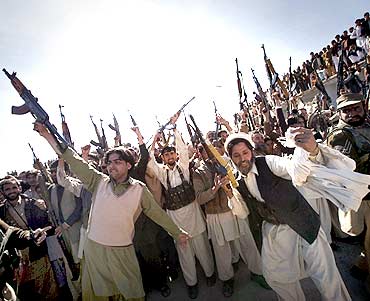
Clinton pointed out that "Pakistan has committed over 140,000 troops to operations in extremist safe havens along the border in coordination with Afghan and coalition forces on the Afghan side."
While acknowledging that "we believe the Pakistanis can and must do more to shut down the flow of insurgents across the border," she emphasised, "It is important to remember that these kinds of military operations in the tribal areas would have been considered unthinkable just two years ago".
But when asked about militants continuing to enjoy a free passage into Pakistan, Gates said, "First of all, they don't have a free pass at this point."
He explained, "In terms of people coming across, one of the areas of progress has been not only the 140,000 Pakistani troops working some of these safe havens in Swat and South Waziristan and elsewhere, but it is the fact that there is increasing cooperation on both sides of the border in coordinating their military operations."
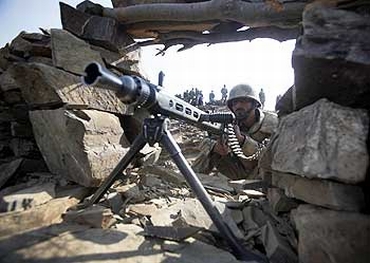
Gates said, "So the Pakistanis come in behind the insurgents from the Pakistani side and, coordinating with us and the Afghans, we're on the other side. And so they're the meat in the sandwich. And we expect to see more of that, and the cooperation is increasing between the Afghans and the Pakistanis."
Clinton began her defence by blaming the George W Bush administration, saying, "If you start from the context that we inherited two years ago, you can understand why we think on the one hand we are making progress, and on the other hand we have a long way to go. And I don't see that those two thoughts are in any way canceling each other out or leading to some kind of rosy outlook. I think we're very clear-eyed and realistic".
She said, "We came into this administration, we had very little in the way of an understanding with Pakistan that the extremists who threatened us were allied with extremists who threatened them, and that in effect they were creating a syndicate of terrorism. And in fact, when we came into office, the Pakistanis had agreed to an ill-conceived peace agreement with the Pakistani Taliban that was consistently and persistently expanding their territorial reach. And we pointed out firmly that this was not a strategy that would work for them, and in fact we had very strong objections to it because it would provide greater and greater territory for Al Qaeda and their allies to operate in."
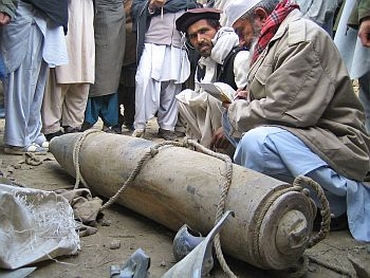
"So what happened? The Pakistanis took an entirely different approach. They moved 140,000 troops off the Indian border. They waged an ongoing conflict against their enemies who happen also to be the allies of our enemies. They began to recognise what we see as a mortal threat to Pakistan's long-term sovereignty and authority. That was not something that was predicted two years ago that they would do. They've done it," she said.
Clinton added, "They've also maintained a civilian government against great odds, and something that has provided more legitimacy to our interactions with them. And we have started what has turned out to be a quite effective, robust strategic dialogue with them, engaging the whole of their government with ours. We also have helped to broker better relations between Pakistan and Afghanistan, and played a major role in bringing about the signing of something called the Transit Trade Agreement, which they had been trying to agree to since 1963."
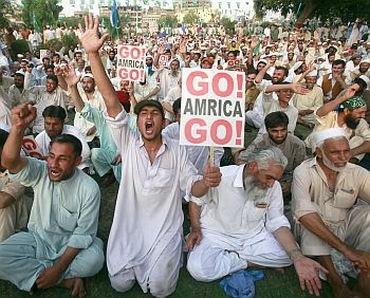
When asked if the military and the ISI were calling the shots in Pakistan, Clinton retorted, "We deal with the entire government. We also talk to the military leadership. Admiral (Mike) Mullen has developed a very positive, cooperative relationship with General Kayani. (CIA Director) Leon Panetta deals regularly with the Director General of the ISI, General Pasha. We are in constant communication."
"And there are certain decisions that are made by different leaders within their government. But it would be a mistake, and it's a mistake that the United States has made continuously over the last 63 years, to move away from the democratically elected civilian leadership of Pakistan," she said, and declared, "Our goal is to help support that leadership, help them understand how to deliver and show that democracy produces results for people. And we intend to do that."
